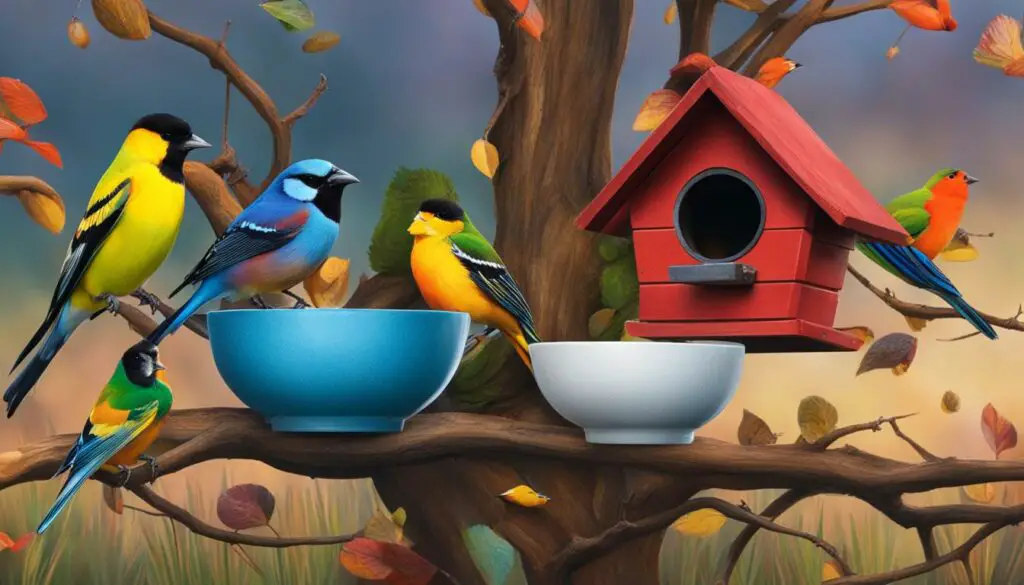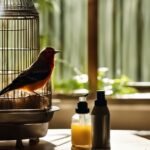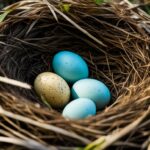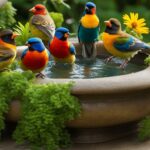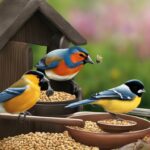Welcome to my comprehensive guide on domesticated birds, the perfect companions for your home. In this article, I will provide expert advice on bird care, including tips on training, behavior, health, nutrition, and more. Whether you’re a seasoned bird owner or considering bringing a feathered friend into your life, I’ve got you covered!
Key Takeaways:
- Domesticated birds make wonderful companions for your home.
- Caring for pet birds involves training, understanding behavior, and maintaining their health and nutrition.
- Building trust and providing companionship are essential for a happy bird-owner relationship.
- Enriching your bird’s cage, allowing them to fly and exercise, and providing a safe environment are crucial for their well-being.
- Proper nutrition, feather care, and grooming are vital aspects of bird care.
Acclimating Your New Bird to Its Cage
Bringing a new bird home is an exciting time, but it’s important to help them feel comfortable in their new environment. Birds are creatures of habit and sudden changes can be stressful for them. To ensure a smooth transition, I recommend acclimating your new bird to its cage by creating a familiar and comforting space.
One way to make your bird feel at ease is by bringing familiar items from their previous environment into the new cage. This could include their favorite toys, perches, or even a piece of fabric or bedding that smells like their old cage. These familiar scents and objects will provide a sense of security and help your bird adjust to their new surroundings.
It’s also important to set up the cage in advance, making sure it’s spacious enough for your bird to move around comfortably. Place perches at different heights and include various toys and enrichment activities to keep them stimulated. Creating a safe and welcoming environment will help your bird feel more relaxed and confident in their new cage.
| Tip | Details |
|---|---|
| Provide a familiar environment | Bring items from the bird’s previous cage |
| Set up the cage in advance | Ensure it’s spacious and includes perches and toys |
Remember, acclimating your new bird to its cage is crucial for their comfort and well-being. By creating a familiar and inviting space, you can help them adjust and settle into their new home.
Creating a Familiar Environment
When acclimating your new bird to its cage, it’s essential to create a familiar environment that mimics their previous living space. This will help them feel more at ease and reduce stress. Here are a few additional tips to keep in mind:
- Place the cage in a quiet area of your home, away from loud noises and other pets.
- Ensure the cage is secure and free from any potential hazards.
- Provide fresh food and water in familiar dishes to encourage eating and drinking.
- Let your bird explore their new cage at their own pace, without forcing them to interact if they seem hesitant.
By following these guidelines, you can create a comfortable and welcoming space for your new feathered friend.
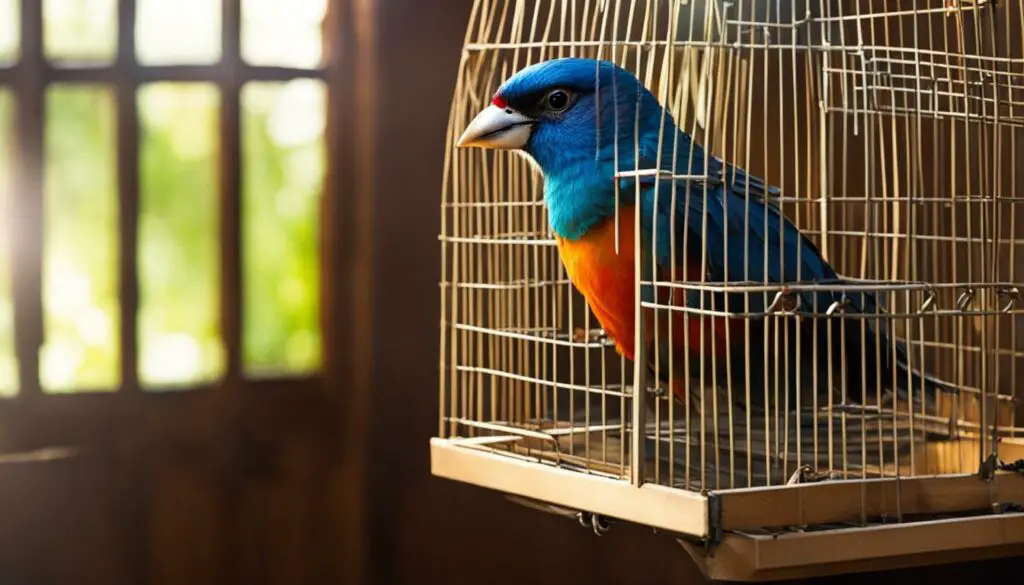
Creating a familiar environment is an important step in helping your new bird adjust to their cage and feel at home. By taking the time to make their surroundings comfortable and secure, you can promote their well-being and build trust. Remember, each bird is unique, so observe their behavior and adjust accordingly to ensure their happiness and comfort.
Building Trust with Your New Bird
Welcome to the exciting journey of bonding with your new bird! Building trust is an essential foundation for a healthy and fulfilling relationship. By following these simple steps, you can establish a strong bond based on trust and companionship.
Step 1: Patience and Consistency: Take the time to talk to your bird in a calm and soothing voice. This will help them get familiar with your presence and voice. It’s important to be patient and consistent in your interactions, allowing your bird to feel comfortable and safe.
Step 2: Gradual Introduction: Start by simply talking to your bird and letting them get used to your presence. As they become more comfortable, gradually introduce handling and interaction. Offer your hand as a perch and let your bird decide when they are ready to perch on your finger or hand. Remember, trust takes time to build, so go at your bird’s pace.
Step 3: Positive Reinforcement: Use treats and positive reinforcement to reward your bird for trusting and bonding with you. Find out what treats your bird enjoys and use them as a way to reinforce positive behaviors. This will help create a positive association with you and build trust.
Remember, every bird is unique, and building trust may take longer for some birds compared to others. Be patient, dedicated, and understanding throughout the process, and you will soon form a deep and meaningful bond with your new feathered friend.
Testimonial:
“Building trust with my new bird was a rewarding experience. The key was to let her set the pace and not rush the bonding process. With time, patience, and positive reinforcement, our relationship has grown stronger, and she now happily perches on my hand and enjoys cuddle sessions. Trust is the foundation of our companionship, and I’m grateful for the bond we have.” – Sarah, Bird Enthusiast
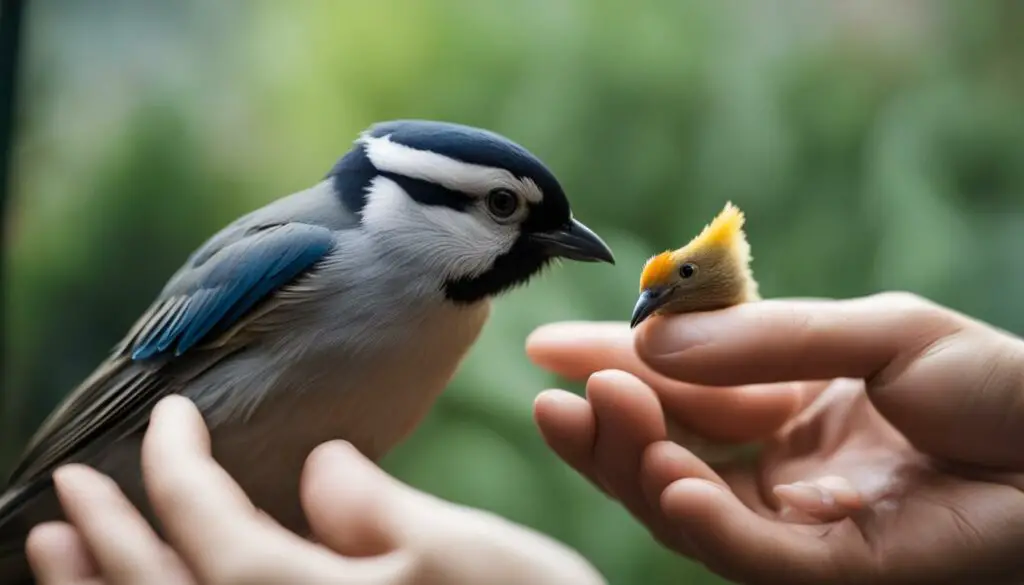
Providing Enrichment in the Cage
Keeping your bird engaged and stimulated is essential for their overall well-being. By providing enrichment in their cage, you can prevent boredom and promote their mental and physical health. Offering a variety of toys that cater to your bird’s preferences is a great way to keep them entertained.
When choosing bird toys, consider their species and individual preferences. Some birds enjoy chewing toys, while others prefer interactive puzzles or toys that encourage foraging. Observe your bird’s behavior and play habits to determine which toys they enjoy the most. Remember to rotate the toys regularly to keep things interesting for your feathered friend.
Here are some popular types of bird toys:
- Chew toys: Birds have a natural instinct to chew, and providing them with safe chew toys made from bird-safe materials can help fulfill this instinct and prevent them from damaging their feathers or beak.
- Foraging toys: These toys are designed to mimic the natural foraging behavior of birds in the wild. They typically have hidden compartments or puzzles that require your bird to find and retrieve treats or toys.
- Interactive toys: These toys require your bird’s interaction to activate sounds, lights, or movement. They can provide mental stimulation and keep your bird entertained for hours.
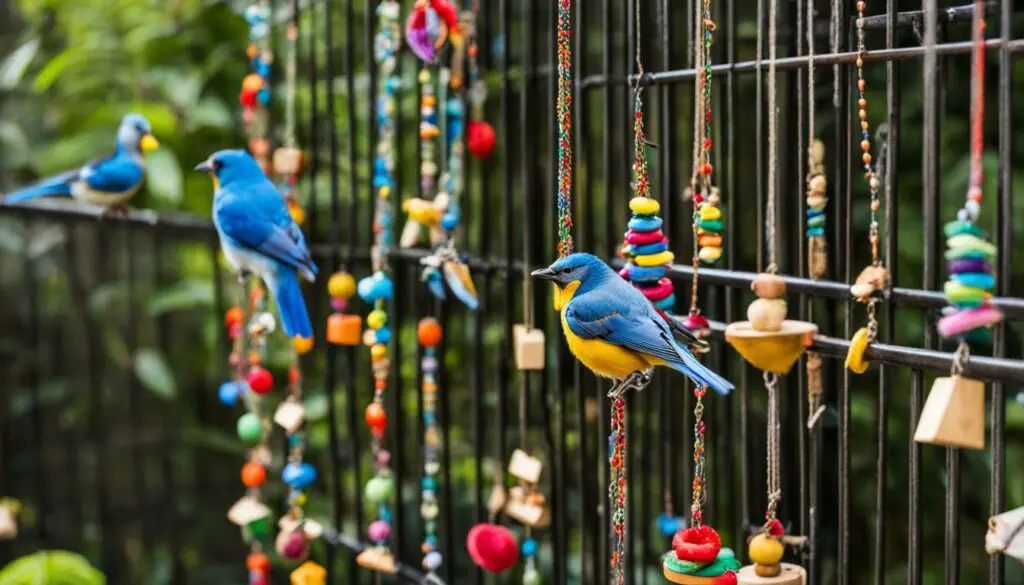
It’s important to keep in mind that not all toys are suitable for all bird species. Some birds may have specific preferences or sensitivities. Always supervise your bird while they’re playing with toys to ensure their safety. If you’re unsure about which toys are appropriate for your bird, consult with an avian veterinarian or a knowledgeable bird specialist.
The Importance of Companionship for Birds
Companionship is a vital aspect of a bird’s well-being and overall happiness. Birds are social creatures that thrive on interaction and the company of their own kind. It is essential to understand the importance of companionship when considering bird ownership. Whether you already have a single bird or are thinking of adding a new feathered friend to your household, providing companionship should be a priority.
Introducing a companion bird can greatly enhance the quality of life for your existing bird. Birds that have the opportunity to socialize and interact with each other exhibit more natural behaviors, such as vocalization, play, and mutual grooming. They provide each other with mental stimulation and a sense of belonging.
When bringing a new bird into the mix, it is crucial to ensure a smooth transition and monitor their interactions. Some birds may require a period of adjustment and need time to establish their hierarchy within the flock. It is essential to provide enough space, resources, and attention to each bird to avoid conflicts.
Benefits of Multiple Birds
Having multiple birds in your household offers several advantages. It allows for increased socialization, which can prevent loneliness and boredom. Birds that have companions are less likely to develop behavior problems such as excessive calling or feather plucking. Additionally, multiple birds can provide each other with companionship and entertainment when you are unable to be present.
| Benefits of Multiple Birds | Summary |
|---|---|
| Increased socialization | Birds have more opportunities to interact and engage in natural behaviors. |
| Prevention of loneliness and boredom | Birds are less likely to exhibit negative behaviors when they have companions. |
| Companionship and entertainment | Birds can provide each other with stimulation and company when you are unavailable. |
Remember, it is essential to choose a companion bird that is compatible with your existing bird in terms of species, size, and temperament. Research the characteristics and social needs of the bird species you are considering to ensure a harmonious pairing.
Providing companionship for your birds is a fundamental aspect of responsible bird ownership. By understanding the importance of social interaction and introducing suitable companions, you can create a stimulating and fulfilling environment for your feathered friends.
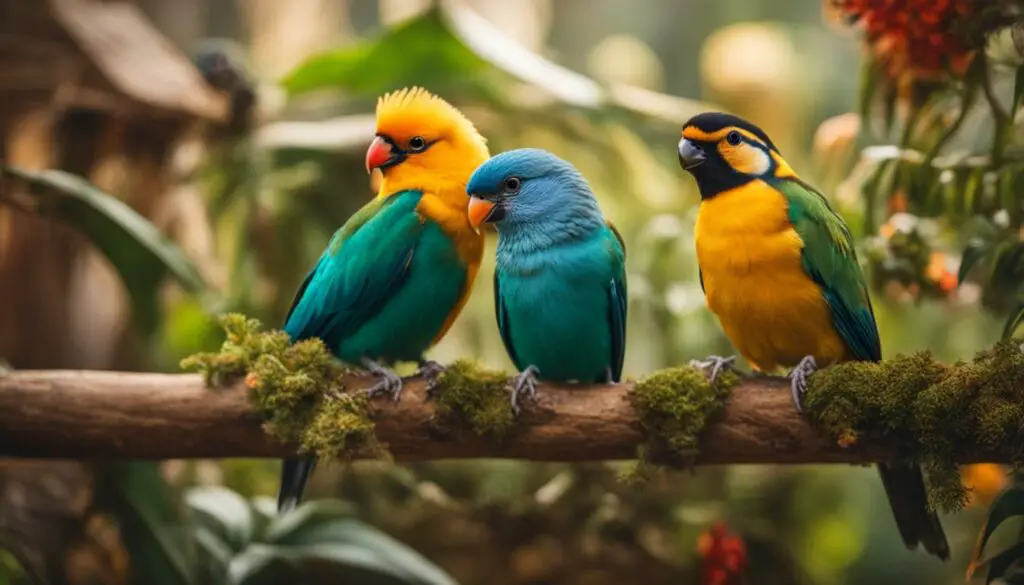
Allowing Birds to Fly and Exercise
One of the most important aspects of caring for pet birds is ensuring that they have ample opportunities to fly and exercise. Flight is a natural behavior for birds, and it plays a crucial role in their physical and mental well-being. Not only does flying provide exercise for their muscles and cardiovascular system, but it also stimulates their minds and allows them to express their natural instincts.
“Flight is the essence of a bird’s existence. It allows them to explore their environment, strengthen their muscles, and experience the freedom they were born to enjoy.” – Dr. Emily Williams, Avian Specialist
To provide birds with the opportunity to fly, it is ideal to have an outdoor aviary. However, if you don’t have access to an outdoor space, you can create a bird-proofed room in your home where they can spread their wings and take short flights. This room should be free of hazards such as open windows or ceiling fans and have plenty of perches at different heights to encourage movement.
If a dedicated room is not possible, you can also provide a large flight cage that allows your birds to move around and stretch their wings. Ensure that the cage is spacious enough to accommodate their natural flight patterns, with enough room for them to hop from perch to perch. Fill the cage with a variety of perches and toys to encourage physical activity and mental stimulation.
Regular exercise is crucial for preventing obesity and maintaining overall health in birds. By allowing them to fly and providing opportunities for physical activity, you are contributing to their well-being and ensuring a happy and fulfilling life for your feathered friends.
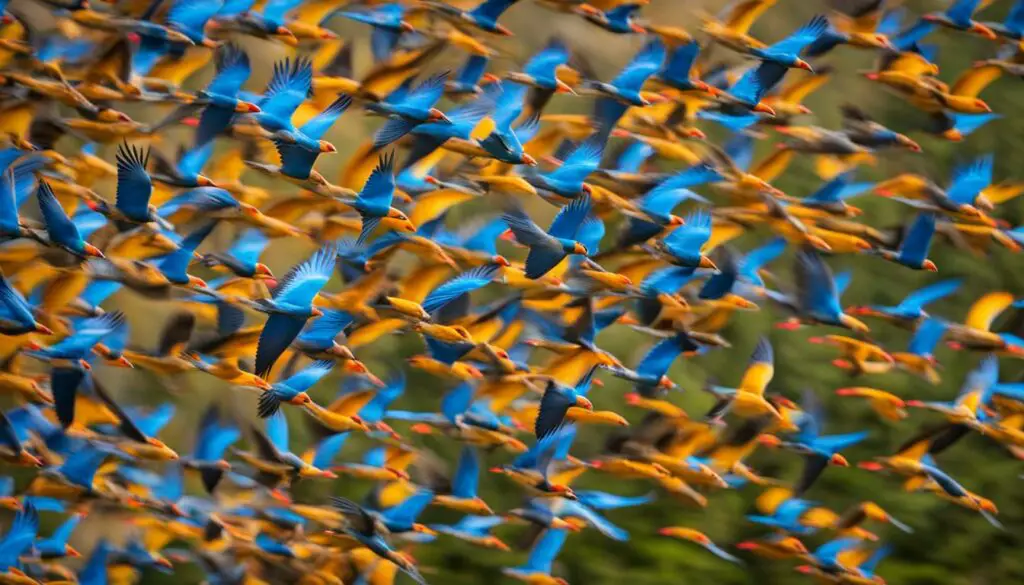
Proper Nutrition for Pet Birds
Proper nutrition plays a vital role in the health and well-being of pet birds. It is important to provide a balanced and varied diet to meet their specific nutritional needs. While seeds are a common part of a bird’s diet, they should not be the only source of nutrition. A varied diet that includes fruits, vegetables, grains, nuts, cooked beans, and seeds is essential for their overall health.
Table: Nutritional Requirements for Common Pet Birds
| Bird Species | Recommended Foods |
|---|---|
| Parakeets (Budgerigars) | Fresh fruits and vegetables, fortified pellets, and occasional seeds |
| Cockatiels | Dark leafy greens, carrots, whole grains, fortified pellets, and occasional seeds |
| Lovebirds | Apples, grapes, broccoli, fortified pellets, and occasional seeds |
| Macaws | Nuts, seeds, fruits, vegetables, and fortified pellets |
| African Grey Parrots | Variety of fruits, vegetables, nuts, seeds, and fortified pellets |
Source: Avian Nutrition Guide
In addition to providing a varied diet, it is important to monitor your bird’s weight and adjust their food intake accordingly. Obesity is a common health concern among pet birds, and it can lead to a range of problems. Consult with an avian veterinarian to determine the appropriate portion sizes and feeding schedule for your bird.
Remember to provide fresh, clean water at all times and ensure that food and water dishes are kept clean to prevent bacterial growth. Regularly inspect the food for signs of spoilage and remove any uneaten or spoiled food from the cage.
By offering a nutritious and varied diet, you can help ensure that your pet bird stays happy and healthy for years to come.
Feather Care and Grooming
Feather care is an important aspect of keeping your pet bird healthy and happy. Birds spend a significant amount of time preening their feathers to keep them clean, aligned, and in good condition. Preening helps to remove dirt, oil, and parasites from the feathers, as well as maintain the waterproofing ability of the plumage. As a bird owner, you can support your bird’s preening process by providing them with opportunities for bathing and ensuring their feathers are in optimal condition.
Bathing is an essential part of feather care for birds. It helps to remove dust, dirt, and excess oil from the feathers, keeping them clean and preventing matting. You can offer your bird a shallow container or a birdbath filled with lukewarm water for them to bathe in. Alternatively, you can mist your bird with a fine spray of water if they enjoy it. Bathing not only aids in feather maintenance but also provides a refreshing and enjoyable experience for your feathered friend.
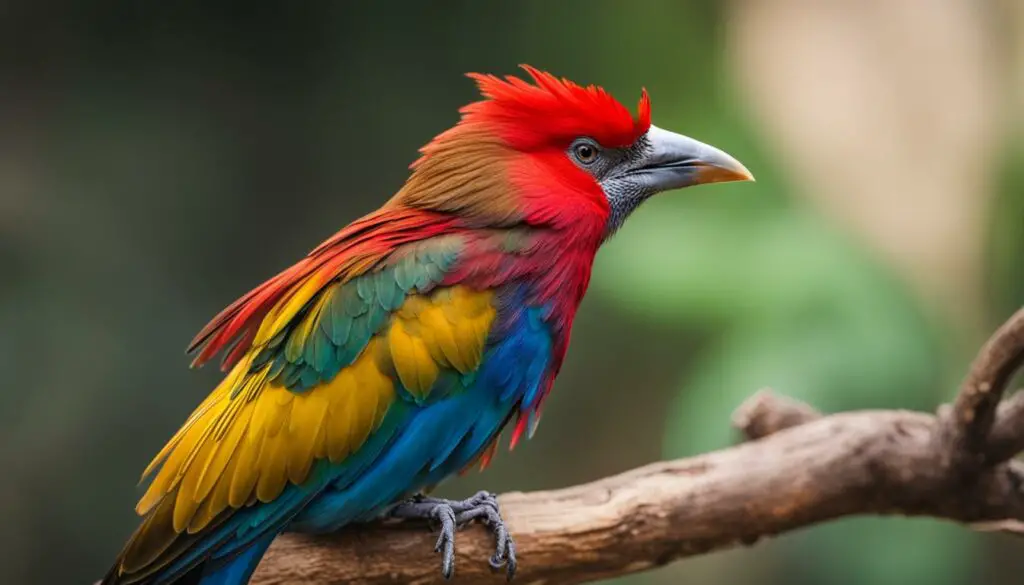
While birds are generally self-sufficient when it comes to feather care, there are instances where they may require assistance. Overgrown beaks or nails can be trimmed by a qualified avian veterinarian. However, it’s important to note that beak trims should only be performed if necessary due to an underlying health issue. Regular veterinary check-ups can help identify any potential problems with your bird’s feathers, beak, or nails and ensure they are properly addressed.
Key Points:
- Feather care is essential for the health and well-being of pet birds.
- Bathing helps to keep feathers clean and prevents matting.
- Offer a shallow container or mist your bird with water for bathing.
- Consult with an avian veterinarian for beak trims or nail trims if necessary.
By paying attention to feather care and grooming, you can help your pet bird maintain healthy and vibrant plumage. Regular bathing and occasional assistance from a veterinarian will ensure that your bird’s feathers stay in optimal condition. Remember to observe your bird’s behavior and seek professional advice if you notice any abnormal changes in their feather quality or appearance.
Creating a Safe Environment for Birds
When it comes to providing a safe environment for your feathered friends, bird-proofing is essential. Birds are naturally curious and can get themselves into trouble if there are hazards present in their surroundings. Here are some important steps you can take to ensure the safety of your beloved birds.
Eliminating Bird Hazards
Start by identifying and eliminating potential hazards in your home. Cover or remove ceiling fans, as the fast-spinning blades can cause serious harm to birds. Keep the toilet lid closed to prevent accidental drowning. It’s also crucial to be aware of toxic plants, as certain species can be harmful or even fatal to birds if ingested. Research common household plants and ensure that none of them pose a threat. Use non-toxic cleaning products and avoid exposing your birds to fumes from cooking or cleaning chemicals.
Creating a Bird-Safe Space
Another important aspect of bird-proofing is creating a safe space for your birds to roam and explore. Minimize the risk of injury by removing or securing potentially dangerous objects such as sharp edges or small items that can be swallowed. Consider providing your birds with a designated play area that is free from hazards, where they can safely stretch their wings and exercise.
Offering a Safe Outdoor Experience
If you plan to allow your birds to spend time outdoors, it’s crucial to ensure their safety. Provide a sturdy and secure outdoor aviary or use bird-safe netting to enclose the space. This will protect your birds from predators and prevent them from flying away. Regularly inspect the outdoor environment for any potential threats such as sharp objects or toxic plants that may have grown.
| Hazard | Solution |
|---|---|
| Ceiling fans | Remove or cover ceiling fans to prevent injuries. |
| Toilet | Keep the toilet lid closed to prevent accidental drowning. |
| Toxic plants | Research and remove any toxic plants from your home. |
| Sharp objects | Remove or secure any sharp objects that can cause injuries. |
| Small items | Avoid having small items around that can be swallowed. |
| Outdoor threats | Inspect the outdoor environment for potential hazards. |
By taking these precautions and creating a safe environment for your birds, you can ensure their well-being and provide them with a happy and secure home.
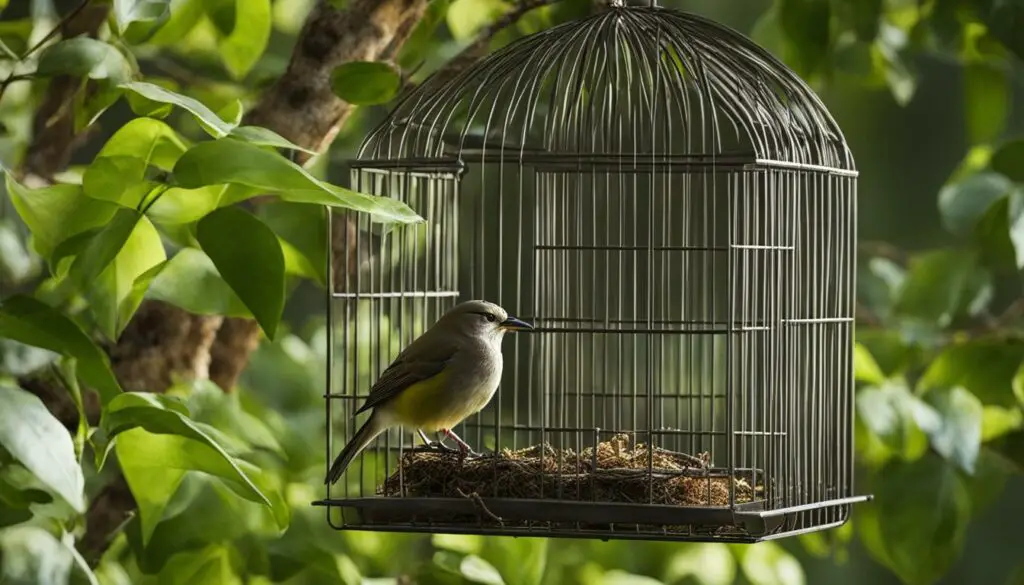
Finding the Right Home for Unwanted Birds
When circumstances arise where you are unable to meet the needs of your bird or you come across an unwanted bird, it is important to find them a new home where their needs will be properly met. Surrendering the bird to a reputable bird sanctuary or rescue organization is the best course of action in such situations. These organizations specialize in caring for birds and can ensure that they are placed in appropriate homes where they will receive the necessary love and attention.
By surrendering your bird to a bird sanctuary or rescue organization, you are prioritizing the well-being of the bird. These organizations have experienced staff and volunteers who understand the unique needs of different bird species and can provide them with the care they require. They also have the resources and facilities to create a safe and stimulating environment for the birds, ensuring that their physical and mental health is well taken care of.
Adoption is another option to consider if you are looking to provide a forever home for an unwanted bird. Many bird sanctuaries and rescue organizations have birds available for adoption. Before adopting a bird, it is important to conduct thorough research on the species you are interested in and understand their specific needs. This will ensure that you are able to provide the appropriate care and environment for the bird.
Adopting a bird is a rewarding experience, as you are giving a second chance to a bird in need. It is important to remember that owning a bird is a long-term commitment and requires dedication and care. By providing a loving and suitable home for an unwanted bird, you are making a positive impact on its life and contributing to the well-being of domesticated birds as a whole.
| Reasons to Surrender or Adopt a Bird | Surrendering to a Bird Sanctuary or Rescue Organization | Adopting a Bird |
|---|---|---|
| Unable to meet the needs of the bird | Specialized care and attention from experienced staff and volunteers | Giving a second chance to a bird in need |
| Encounter an unwanted bird | Create a safe and stimulating environment for the bird | Research and understand the specific needs of the bird |
| – | Prioritize the well-being of the bird | Long-term commitment and dedication |
The Joys and Challenges of Bird Ownership
Owning a pet bird can be a truly rewarding experience. The joys of having a bird as a companion are numerous. From their beautiful plumage to their cheerful chirping, birds bring a sense of life and vibrancy to any home. They can be affectionate and form strong bonds with their human caretakers, providing companionship and entertainment.
Interacting with a bird can be a lot of fun. They have unique personalities and can learn tricks and mimic human speech, creating a delightful and entertaining environment. From watching them fly freely in your bird-proofed room to sharing quiet moments together, the joys of bird ownership are endless.
However, it’s important to acknowledge that owning a bird also comes with its challenges. Birds require a significant amount of care and attention. They can be messy, with feathers and seed husks scattered around their cage. Some species can be noisy, which may not be suitable for those who live in close quarters or have noise-sensitive neighbors. Additionally, birds have specialized dietary and environmental needs that must be met to ensure their health and well-being.
Despite these challenges, with the right commitment and knowledge, the joys of bird ownership far outweigh the difficulties. The bond that can be formed with a bird is incredibly rewarding, and the love and companionship they provide make it all worthwhile. By understanding the needs of your feathered friend and providing them with a nurturing and stimulating environment, you can create a harmonious and fulfilling relationship that will bring you joy for years to come.
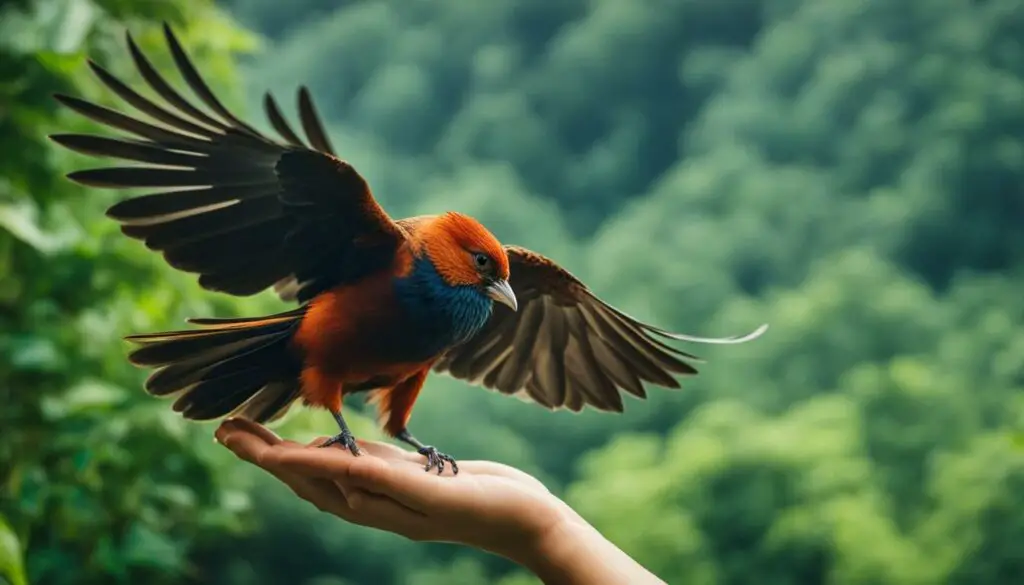
Table: Joys and Challenges of Bird Ownership
| Joys of Bird Ownership | Challenges of Bird Ownership |
|---|---|
| Companionship and bonding | Messiness |
| Entertainment and unique personalities | Noise (depending on the species) |
| Learning tricks and mimicry | Specialized dietary and environmental needs |
| Watching them fly and explore | Commitment of time and care |
As with any pet, it’s important to carefully consider the joys and challenges of bird ownership before making the decision to bring a bird into your home. With proper care, love, and attention, the joys of bird ownership can far outweigh any challenges you may encounter along the way.
The Role of Bird Enthusiasts in Avian Welfare
As bird enthusiasts, we have a unique opportunity to contribute to the welfare and conservation of these incredible creatures. By advocating for responsible bird ownership, supporting rescue organizations, and raising awareness about the needs of birds, we can make a positive impact on their lives.
One way to get involved is by promoting avian welfare through education. We can share our knowledge and experiences with others, helping them understand the importance of providing proper care and enrichment for domesticated birds. By teaching bird owners about appropriate nutrition, housing, and socialization, we can help ensure that birds lead happy and healthy lives.
Another way to advocate for avian welfare is by supporting bird rescue organizations. These organizations play a vital role in providing specialized care for birds in need. By volunteering our time or donating resources, we can help provide shelter, medical care, and rehabilitation for birds that have been neglected or abandoned.
“The greatness of a nation and its moral progress can be judged by the way its animals are treated.” – Mahatma Gandhi
Table: Avian Welfare Organizations
| Organization | Mission | Website |
|---|---|---|
| Birds of a Feather Rescue | Rescuing and rehabilitating abandoned, abused, and neglected birds | www.birdsfeatherrescue.org |
| Avian Conservation Alliance | Supporting bird conservation efforts through research, advocacy, and public education | www.avianconservationalliance.org |
| Feathered Friends Sanctuary | Providing lifelong care and sanctuary for birds in need | www.featheredfriendssanctuary.org |
By actively participating in avian welfare initiatives and organizations, we can make a difference in the lives of domesticated birds. Together, we can ensure that these beautiful creatures receive the love, care, and respect they deserve.

Conclusion
In conclusion, caring for domesticated birds is a rewarding experience that requires dedication and a deep understanding of their needs. By following the expert advice provided in this guide, you can provide a loving and nurturing environment for your pet birds.
Remember that domesticated birds thrive on companionship, so consider adopting a companion bird to ensure their social and emotional well-being. Additionally, providing a balanced and varied diet, along with opportunities for exercise and mental stimulation, is essential for their overall health.
Creating a safe and bird-proofed environment is crucial to prevent any accidents or exposure to harmful substances. Take the necessary precautions to eliminate hazards and provide a secure space for your feathered friends to explore.
Lastly, always prioritize the well-being of your birds and consider surrendering them to a reputable bird sanctuary or rescue organization if you are unable to meet their needs. This ensures that they will be placed in a suitable environment where their needs will be met.
FAQ
How can I acclimate my new bird to its cage?
To acclimate your new bird to its cage, bring familiar items from their previous environment into the cage, such as toys and food. Set up the cage in advance and let the bird explore and familiarize themselves with their new surroundings at their own pace.
How can I build trust with my new bird?
Building trust with your new bird takes time and patience. Talk to your bird in a calm and soothing voice, gradually introducing handling and interaction. Start with just talking to the bird and eventually work towards having them perch on your hand. Consistency is key in establishing a bond of trust with your bird.
How can I provide enrichment in my bird’s cage?
You can provide enrichment in your bird’s cage by offering a variety of toys that cater to their preferences, such as chew toys or interactive puzzles. Observe your bird’s behavior and preferences to determine which toys they enjoy the most. Remember to rotate the toys regularly to keep things interesting.
Is companionship important for birds?
Yes, companionship is essential for the well-being of birds. If you have a single bird, consider adopting a companion of the same or similar species. Birds are social creatures and thrive in the presence of their own kind. Take the necessary steps to ensure a smooth transition and monitor their interactions to ensure they get along well.
How can I allow my birds to exercise?
Whenever possible, allow your birds to fly freely in a safe and bird-proofed space. If you don’t have access to an outdoor aviary, create a bird-proofed room or provide a large flight cage for your birds to exercise in. Regular exercise helps to prevent obesity and promotes overall well-being.
What should I feed my pet bird?
A balanced and varied diet is essential for the health of pet birds. Offer a mix of fruits, vegetables, grains, nuts, cooked beans, and seeds. Different bird species have specific nutritional needs, so research or consult with an avian veterinarian to ensure you are providing the right diet for your bird. Avoid relying solely on seed diets, as this can lead to malnutrition.
How should I care for my bird’s feathers?
Birds spend a significant amount of time preening their feathers to keep them in good condition. You can provide shallow containers or a birdbath filled with water for bathing, or mist your birds with a fine spray of water if they enjoy it. Regular preening helps to maintain feather health. Beak trims should only be necessary if there is an underlying health issue, and overgrown nails or beaks should be addressed by an avian veterinarian.
How can I create a safe environment for my birds?
To create a safe environment for your birds, bird-proof your home by eliminating or covering up hazards such as ceiling fans, open toilets, toxic plants, and potentially dangerous objects. Use non-toxic cleaning products and avoid exposing your birds to fumes from nonstick cookware or cleaning chemicals. Ensure that your birds have a safe and secure space to explore without the risk of injury.
What should I do if I can’t meet the needs of my bird or come across an unwanted bird?
If you are unable to meet the needs of your bird or come across an unwanted bird, consider surrendering them to a reputable bird sanctuary or rescue organization. These organizations provide specialized care for birds and can ensure that they are placed in appropriate homes where their needs will be met. Prioritize the well-being of the bird and ensure they are placed in a suitable environment.
What are the joys and challenges of bird ownership?
While owning a pet bird can bring great joy and companionship, it also comes with its own set of challenges. Birds require time, effort, and a commitment to meeting their needs. They can be noisy, messy, and may require specialized care. Consider the joys and challenges of bird ownership before making the decision to bring a bird into your home.
What is the role of bird enthusiasts in avian welfare?
Bird enthusiasts play a crucial role in advocating for the welfare and conservation of domesticated birds. By promoting responsible bird ownership, supporting rescue organizations, and raising awareness about the needs of birds, enthusiasts can contribute to the well-being of these beautiful creatures. Get involved in bird-related initiatives and organizations to make a positive impact.
Source Links
- https://zupreem.com/avian/5-steps-to-successfully-bringing-a-new-bird-home/
- https://www.peta.org/living/animal-companions/caring-animal-companions/caring-birds/
- https://www.indigo.ca/en-ca/the-complete-practical-guide-to-pet-and-aviary-birds-how-to-keep-pet-birds-with-expert-advice-on-buying-housing-feeding-handling-breeding-and-exhibiting/9780754834885.html

